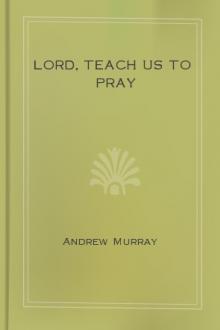Where No Fear Was - Arthur Christopher Benson (best books to read for self improvement .TXT) 📗

- Author: Arthur Christopher Benson
Book online «Where No Fear Was - Arthur Christopher Benson (best books to read for self improvement .TXT) 📗». Author Arthur Christopher Benson
XIII
CHARLOTTE BRONTE
I doubt if the records of intimate biography contain a finer object-lesson against fear and all its obsessions than the life of Charlotte Bronte. She was of a temperament which in many ways was more open to the assaults of fear than any which could well be devised. She was frail and delicate, liable to acute nervous depression, intensely shy and sensitive, and susceptible as well; that is to say that her shyness did not isolate her from her kind; she wanted to be loved, respected, even admired. When she did love, she loved with fire and passion and desperate loyalty.
Her life was from beginning to end full of sharp and tragic experiences. She was born and brought up in a bleak moorland village, climbing steeply and grimly to the edge of heathery uplands. The bare parsonage, with its little dark rooms, looks out on a churchyard paved with graves. Her father was a kindly man, but essentially moody and solitary. He took all his meals alone, walked alone, sate alone. Her mother died of cancer, when she was but a child. Then she was sent to an ill-managed austere school, and here when she was nine years old her two elder sisters died. She took service two or three times as a governess, and endured agonies of misunderstanding, suspicious of her employers, afraid of her pupils, longing for home with an intense yearning. Then she went out to a school at Brussels, where under the teaching of M. Heger, a gifted professor, her mind and heart awoke, and she formed for him a strange affection, half an intellectual devotion, half an unconscious passion, which deprived her of her peace of mind. Her sad and wistful letters to him, lately published, were disregarded by him, partly because his wife was undoubtedly jealous of the relation, partly because he was disconcerted by the emotion he had aroused. Her brother, a brilliant, wayward, and in some ways attractive boy, got into disgrace, and drifted home, where he tried to console himself with drink and opium. After three years of this horrible life, he died, and within twelve months her two surviving sisters, Emily and Anne, developed consumption and died. As Robert Browning says, there indeed was "trouble enough for one!"
Now it must be borne in mind that her temperament was naturally hypochondriacal.
Let me quote a passage dealing with the same experience; it is undoubtedly autobiographical, though it comes from Villette, into which Charlotte Bronte threw the picture of her own solitary experiences in Brussels. She is left alone at the pensionnat in the vacation, strained by work and anxiety, and tortured by exhaustion, restlessness, and sleeplessness:--
"One day, perceiving this growing illusion, I said, 'I really believe my nerves are getting overstretched: my mind has suffered somewhat too much; a malady is growing upon it--what shall I do? How shall I keep well?'
"Indeed there was no way to keep well under the circumstances. At last a day and night of peculiarly agonising depression were succeeded by physical illness; I took perforce to my bed. About this time the Indian summer closed, and the equinoctial storms began; and for nine dark and wet days, of which the hours rushed on all turbulent, deaf, dishevelled--bewildered with sounding hurricane--I lay in a strange fever of the nerves and blood. Sleep went quite away. I used to rise in the night, look round for her, beseech her earnestly to return. A rattle of the window, a cry of the blast only replied--Sleep never came!
"I err. She came once, but in anger. Impatient of my importunity she brought with her an avenging dream. By the clock of St. Jean Baptiste, that dream remained scarce fifteen minutes--a brief space, but sufficing to wring my whole frame with unknown anguish; to confer a nameless experience that had the hue, the mien, the terror, the very tone of a visitation from eternity. Between twelve and one that night a cup was forced to my lips, black, strong, strange, drawn from no well, but filled up seething from a bottomless and boundless sea. Suffering, brewed in temporal or calculable measure, and mixed for mortal lips, tastes not as this suffering tasted. Having drank [sic] and woke, I thought all was over: the end come and passed by. Trembling fearfully--as consciousness returned--ready to cry out on some fellow-creature to help me, only that I knew no fellow-creature was near enough to catch the wild summons--Goton in her far distant attic could not hear--I rose on my knees in bed. Some fearful hours went over me; indescribably was I torn, racked and oppressed in mind. Amidst the horrors of that dream I think the worst lay here. Methought the well-loved dead, who had loved ME well in life, met me elsewhere alienated; galled was my inmost spirit with an unutterable sense of despair about the future. Motive there was none why I should try to recover or wish to live; and yet quite unendurable was the pitiless and haughty voice in which Death challenged me to engage his unknown terrors. When I tried to pray I could only utter these words:--
"'From my youth up Thy terrors have I suffered with a troubled mind.'"
The deep interest of this experience is that it was endured by one who was not only intellectually endowed beyond most women of her time, but whose sanity, reasonableness, and moral force were conspicuously strong. Charlotte Bronte was not one of those impulsive and imaginative women who are the prey of every fancy. Throughout the whole of her career, she was for ever compelling her frail and sensitive temperament, with indomitable purpose, to perform whatever she had undertaken to do. There never was anyone who lived so sternly by principle and reason, or who so maintained her self-control in the face of sorrow, disaster, unhappiness, and bereavement. She never gave way to feeble or morbid self-accusation, and therefore the fact that she could thus have suffered is a sign that this unnamed terror can coexist with a dauntless courage and an essential self-command.
Here again is the cry of a desolate heart! She had been going through her sisters' papers not long after their death, and wrote to her great friend:
"I am both angry and surprised at myself for not being in better spirits; for not growing accustomed, or at least resigned, to the solitude and isolation of my lot. But my late occupation left a result, for some days and indeed still, very painful. The reading over of papers, the renewal of remembrances, brought back the pangs of bereavement and occasioned a depression of spirits well-nigh intolerable. For one or two nights I hardly knew how to get on till morning; and when morning came I was still haunted by a sense of sickening distress. I tell you these things because it is absolutely necessary to me to have SOME relief. You will forgive me and not trouble yourself, or imagine that I am one whit worse than I say. It is quite a mental ailment, and I believe and hope is better now. I think so, because I can speak about it, which I never can when grief is at its worst. I thought to find occupation and interest in writing when alone at home, but hitherto my efforts have been in vain: the deficiency of every stimulus is so complete. You will recommend me, I dare say, to go from home; but that does no good, even could I again leave papa with an easy mind. . . . I cannot describe what a time of it I had after my return from London and Scotland. There was a reaction that sank me to the earth, the deadly silence, solitude, depression, desolation were awful; the craving for companionship, the hopelessness of relief were what I should dread to feel again."
Or again, in a somewhat calmer mood, she writes:
"I feel to my deep sorrow, to my humiliation, that it is not in my power to bear the canker of constant solitude. I had calculated that when shut out from every enjoyment, from every stimulus but what could be desired from intellectual exertion, my mind would rouse itself perforce. It is not so. Even intellect, even imagination will not dispense with the ray of domestic cheerfulness, with the gentle spur of family discussions. Late in the evening and all through the nights, I fall into a condition of mind which turns entirely to the past--to memory, and memory is both sad and relentless. This will never do, and will produce no good. I tell you this that you may check false anticipations. You cannot help me, and must not trouble yourself in any shape to sympathise with me. It is my cup, and I must drink it as others do theirs."
It would be difficult to create a picture of more poignant suffering; yet she was at this time a famous writer. She had published Jane Eyre and Shirley, and on her visits to London, to her hospitable publisher, had found herself welcomed, honoured, feted. The great lions of the literary world had flocked eagerly to meet her. Even these simple festivities were accompanied by a deadly sense of strain, anxiety, and exhaustion. Mrs. Gaskell describes how a little later she met Charlotte Bronte at a quiet country-house, and how Charlotte was reduced from tolerable health to a bad nervous headache by the announcement that they were going to drive over in the afternoon to have tea at a neighbour's house--the prospect of meeting strangers was so alarming to her.
But in spite of this agonising susceptibility and vulnerability, there is never the least touch either of sentimentality or self-pity about Charlotte Bronte. She stuck to her duty and faced life with an infinity of patient courage. One of her friends said of her that no one she had ever known had sacrificed more to others, or done it with a fuller consciousness of what she was sacrificing. If duty and affection bade her act, no sense of weakness or of inclination had any power over her. She was afraid of life, but she stood up to it; she was never crushed or broken. Consider the circumstances under which she began to write Jane Eyre. She had written her novel The Professor, and it was returned to her nine several times, by publisher after publisher. Her father was threatened with blindness. She had taken him to Manchester for an operation, installed him in lodgings, and settled down alone to nurse him. The ill-fated Professor came back to her once more with a polite refusal. That very day she wrote the first lines of Jane Eyre. Later on too, with her brother dying of opium and drink, she had begun Shirley, and she finished it after the deaths of her sisters. She was perfectly merciless to herself, saw no reason why she should be spared any sorrow or suffering or ill-health, but looked upon it all as a stern but not unjust discipline. She had one of the most passionately affectionate natures both in friendship and home relations--"my hot tenacious heart," she once says! But there was no touch of softness or sentimentality about her; she never feebly condoned weaknesses; her observation of people was minute, her judgment of them severe and even satirical. Her letters abound in pungent humour and acute perception; and her idea of charity was not that





Comments (0)